Resource Center
The Transit Workforce Center is pleased to host a curated collection of publications and other materials to assist stakeholders engaged in transit workforce development. The Resource Center includes case studies, training materials, research reports, and other materials of interest, including publications produced by federal government agencies, transit organizations, and independent research entities. Resources may be filtered by topic, resource type, and transit mode. This TWC blog post explains how to use the Resource Center.
We are continuing to update the Resource Center regularly. Please contact us via the Request Help menu option if you would like assistance using the Resource Center or are looking for resources on a particular topic. We also welcome suggestions of topics or specific resources to add.
Content in external resources linked from the Resource Center is solely the responsibility of the resource authors and does not necessarily reflect the perspectives of or endorsement by the Transit Workforce Center.
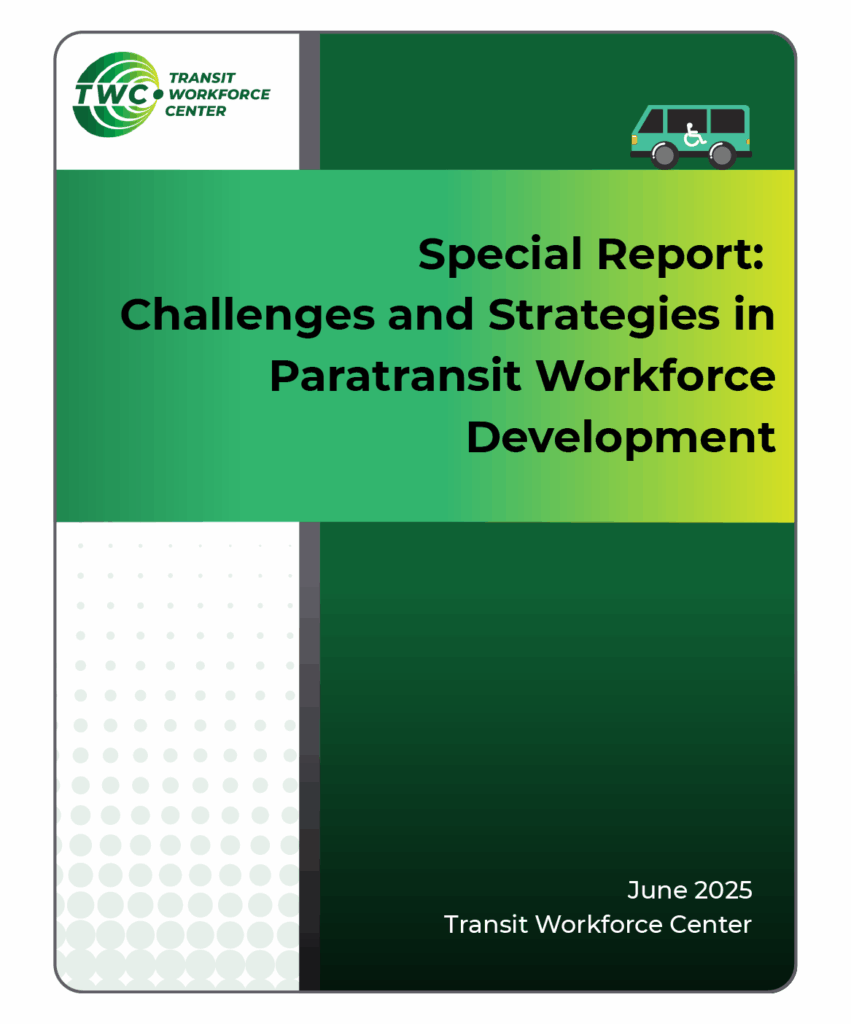
Special Report: Challenges and Strategies in Paratransit Workforce Development
This report aims to provide a brief update to a 2010 study on paratransit operator recruitment and retention, focusing not just on operators but on the entire paratransit workforce, including a range of frontline roles. To learn more about the unique workforce challenges of this modal context, as well as what successful strategies paratransit providers have used to combat those challenges, the Transit Workforce Center (TWC) research team conducted interviews involving 22 individuals across 13 paratransit systems in nine states. This report documents our learning from those interviews.
Transit Workforce Center
June 2025
LEARN MORE
Since the passage of the Americans with Disabilities Act (ADA) in 1990, paratransit has been a staple component of public transportation systems across the United States. ADA complementary paratransit provides transportation to people who, because of a disability, cannot use fixed-route service independently. Despite the importance of this mode in the overall health of urban transportation infrastructure, very little research has focused on the development of the paratransit workforce since a seminal 2010 study on paratransit operator recruitment and retention. This report aims to provide a brief update to the 2010 study, focusing not just on operators but on the entire paratransit workforce, including a range of frontline roles. To learn more about the unique workforce challenges of this modal context, as well as what successful strategies paratransit providers have used to combat those challenges, the Transit Workforce Center (TWC) research team conducted interviews involving 22 individuals across 13 paratransit systems in nine states. This report documents our learning from those interviews.
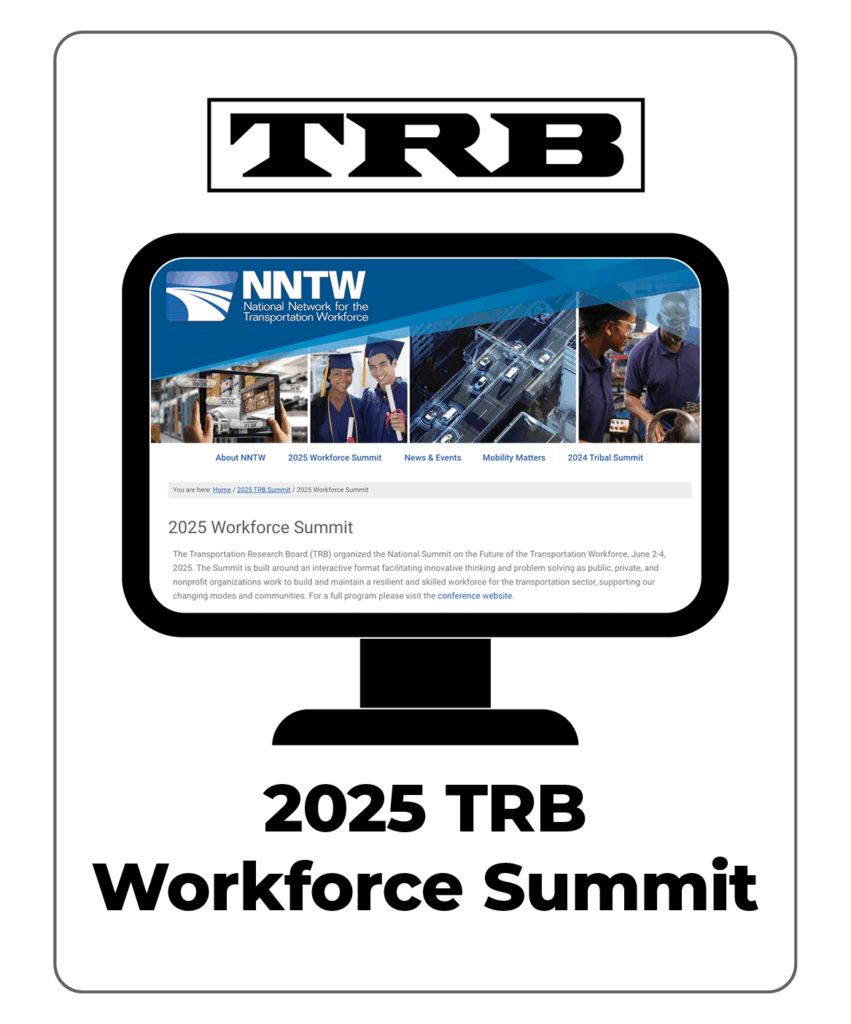
2025 TRB Workforce Summit
The Transportation Research Board (TRB) organized the National Summit on the Future of the Transportation Workforce, June 2-4, 2025. The Summit is built around an interactive format facilitating innovative thinking and problem solving as public, private, and nonprofit organizations work to build and maintain a resilient and skilled workforce for the transportation sector, supporting our changing modes and communities. This landing page provides links to pre-conference webinars and briefing papers from summit sessions.
Transportation Research Board
June 2025
TOPICS: Career Pathways, Community Engagement, Hiring and Recruitment, Policy and Planning, Retention, Workforce Shortage
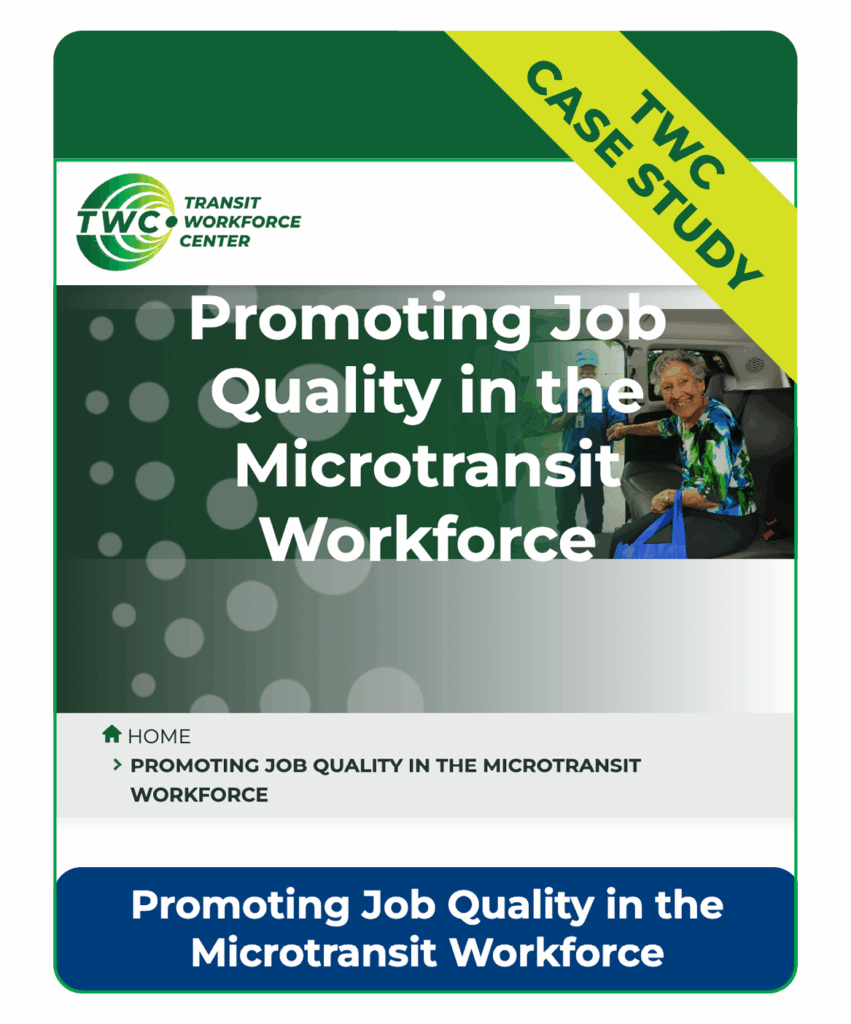
Case Study: Promoting Job Quality in the Microtransit Workforce
Microtransit, a relatively new form of demand response public transportation, is on the rise. TWC’s new set of microtransit case studies provides various perspectives on microtransit that include examples of how it has successfully been provided in-house and with a union-represented workforce. The case studies share experiences from four transit locations that are implementing microtransit service in ways that promote job quality for operators, technicians, and others, while also providing greater control over the quality of the service.
Transit Workforce Center
May 2025
LEARN MORE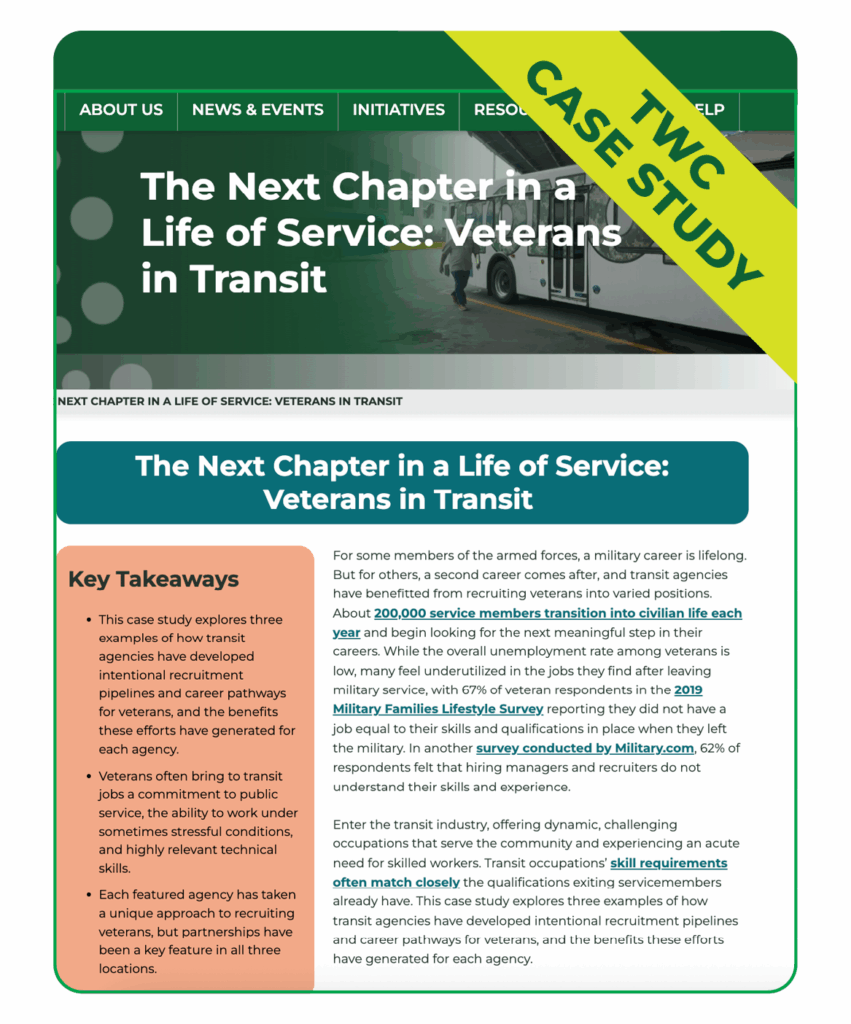
Case Study—The Next Chapter in a Life of Service: Veterans in Transit
For some members of the armed forces, a military career is lifelong. But for others, a second career comes after, and transit agencies have benefitted from recruiting veterans into varied positions. About 200,000 service members transition into civilian life each year and begin looking for the next meaningful step in their careers.
The transit industry offers dynamic, challenging occupations that serve the community and is experiencing an acute need for skilled workers. Transit occupations’ skill requirements often match closely the qualifications exiting servicemembers already have. This case study explores three examples of how transit agencies have developed intentional recruitment pipelines and career pathways for veterans, and the benefits these efforts have generated for each agency.
Transit Workforce Center
March 2025
LEARN MORE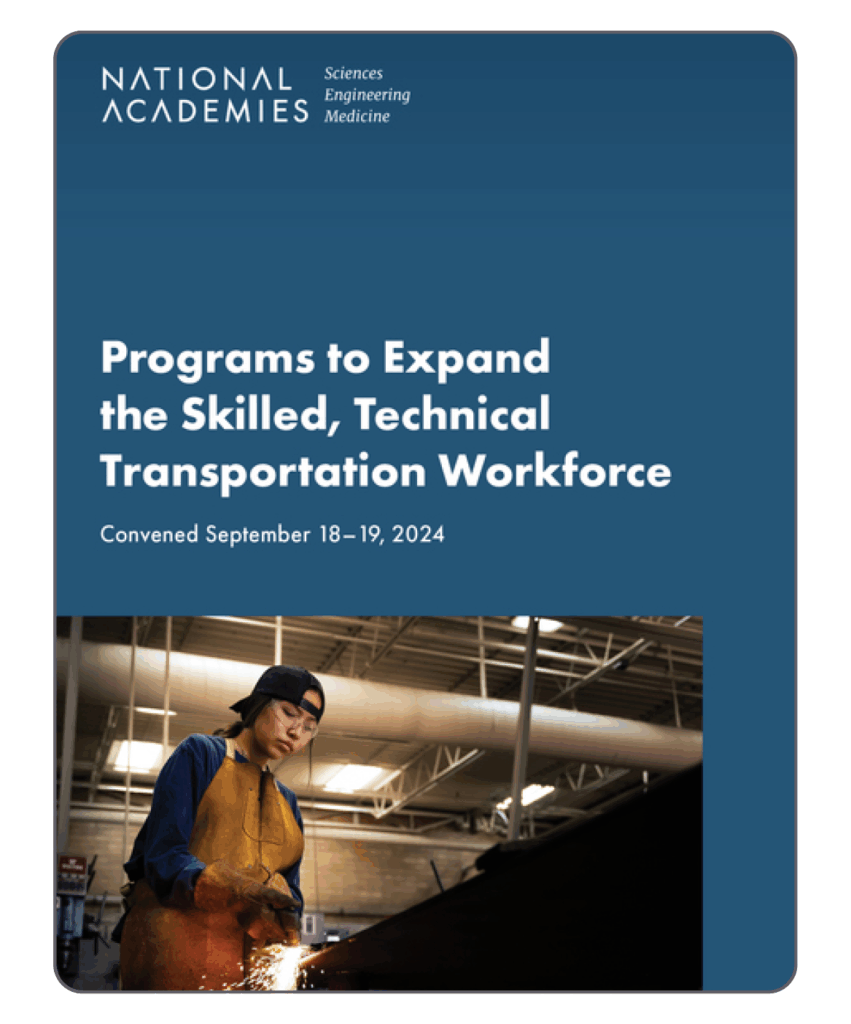
Programs to Expand the Skilled, Technical Transportation Workforce
Programs to Expand the Skilled, Technical Transportation Workforce: Proceedings of a Workshop summarizes the Workforce held in September 2024 at the National Academies of Sciences Building in Washington, DC. The workshop was sponsored by the Federal Transit Administration and the National Science Foundation and brought together experts and educators across academia, government, and industry.
National Academies of Sciences Engineering and Medicine
March 2025
TOPICS: Apprenticeship, Career Pathways, Community Engagement, Hiring and Recruitment, Policy and Planning, Workforce Shortage
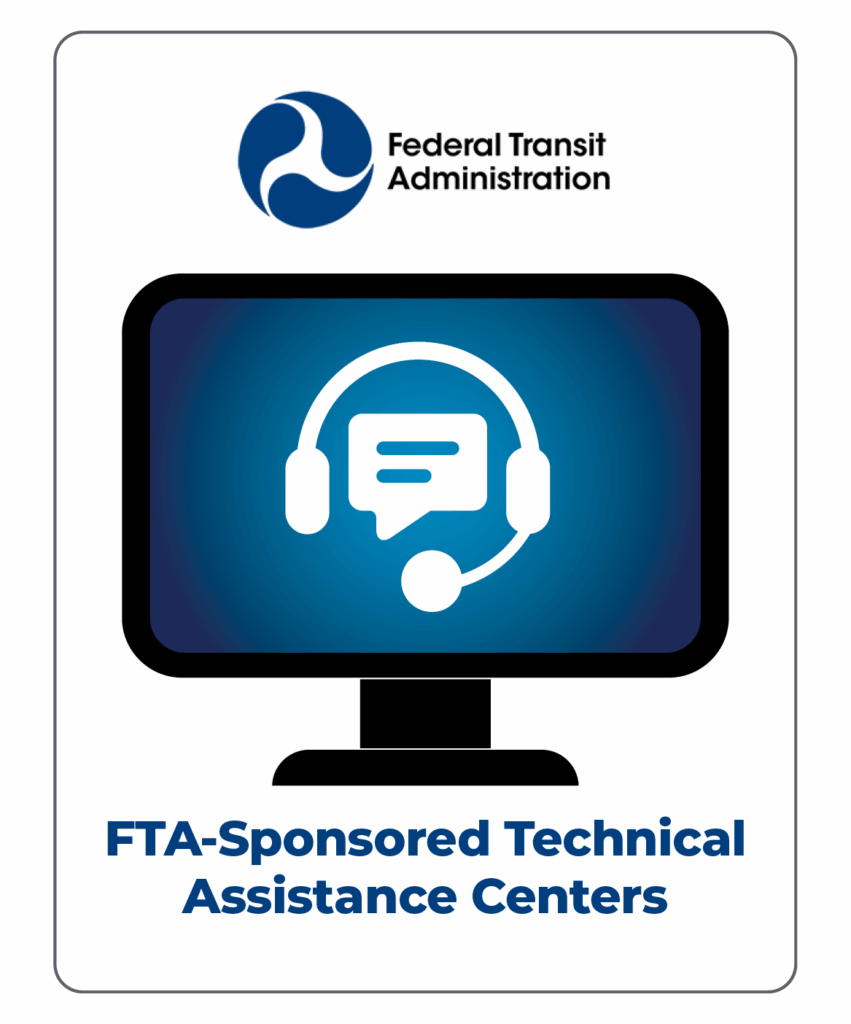
FTA-Sponsored Technical Assistance Centers
FTA’s Technical Assistance and Workforce Development Program (49 U.S.C. § 5314) and the Public Transportation Innovation Program (49 U.S.C. § 5312) fund technical assistance centers through national nonprofit organizations across a number of areas to improve public transportation. These nonprofit partners and the work they do play a critical role in supporting public transit agencies.
Federal Transit Administration
TOPICS: Apprenticeship, Career Pathways, Community Engagement, Hiring and Recruitment, Labor-Management Partnerships, Low-No, Mentorship, Policy and Planning, Procurement, Program Evaluation and ROI, Retention, Safety and Health, Trainer and Mentor Development, Training, Workforce Shortage
FTA’s Technical Assistance and Workforce Development Program (49 U.S.C. § 5314) and the Public Transportation Innovation Program (49 U.S.C. § 5312) fund technical assistance centers through national nonprofit organizations across a number of areas to improve public transportation. These nonprofit partners and the work they do play a critical role in supporting public transit agencies. Their services help to:
- Improve transportation for older adults and people with disabilities
- Drive the adoption of mobility management and related promising practices
- Accelerate innovative mobility practices and strategies
- Support rural communities
- Leverage new transit technologies
- Train the public transit workforce
- Provide workforce development technical assistance
- Support research projects selected by the transit industry that address day to day issues
- Support the transit industry meet safety regulations
National Center for Applied Transit Technology (N-CATT)
The National Center for Applied Transit Technology (N-CATT) delivers expert, focused technical assistance to transit agencies and organizations in rural areas and small cities to use or develop transit technologies and innovations that make services more cost-effective and efficient. N-CATT’s work supports FTA’s mission and focus on innovation by developing and supporting transit programs and services in rural and small-city America.
National Aging and Disability Transportation Center (NADTC)
The National Aging and Disability Transportation Center (NADTC) is a national technical assistance center funded by FTA with guidance from the U.S. Department of Health and Human Services’ Administration for Community Living to promote the availability of transportation options that serve the needs of people with disabilities, seniors and caregivers with a focus on the Section 5310 program and other transit investments. NADTC supports the delivery of more effective, efficient, high-quality and coordinated specialized transportation services that maximize federal investments. NADTC provides technical assistance, information and referral; develops field training; implements interactive communication and outreach strategies; and supports communities in assessing their needs and developing innovative transportation solutions.
National Rural Transit Assistance Program (National RTAP)
The National Rural Transportation Assistance Program (RTAP) was established by FTA in 1987 to provide a wide range of professional services and products. National RTAP addresses the training and technical assistance needs of rural and tribal transit programs across the nation and supports state RTAP programs. National RTAP provides comprehensive free technical assistance programs and resources including training materials, webinars, newsletters and technical briefs, peer resources, research, and innovative technology initiatives. The National RTAP also manages the Transportation Technical Assistance Coordination Library (TACL), which provides a sustainable methodology and platform to access resources across a diverse range of transportation technical assistance centers and FTA.
Shared-Use Mobility Center (SUMC)
The Shared-Use Mobility Center is a public-interest organization dedicated to achieving equitable, affordable, and environmentally sound mobility across the US through the efficient sharing of transportation assets. By connecting the public and private sectors, piloting programs, conducting new research, and providing policy and technical expertise to cities and regions, SUMC seeks to extend the benefits of shared mobility for all. The Shared Mobility 2030 Action agenda includes improving access to public transit, on-demand shuttles or buses, ride-on-demand services, carpooling and vanpooling, and carsharing, bikesharing and scooter-sharing.
Coordinating Council on Access and Mobility (CCAM)
The strategic goal of CCAM, operated but the Community Transportation Association of America, is to support federal agencies, their grantees, partners, and stakeholders in improving transportation access for people with disabilities, older adults, and individuals of low income. CCAM promotes and facilitates human services transportation, public transit, and non-emergency medical transportation (NEMT) coordination that advances people’s access to everyday destinations.
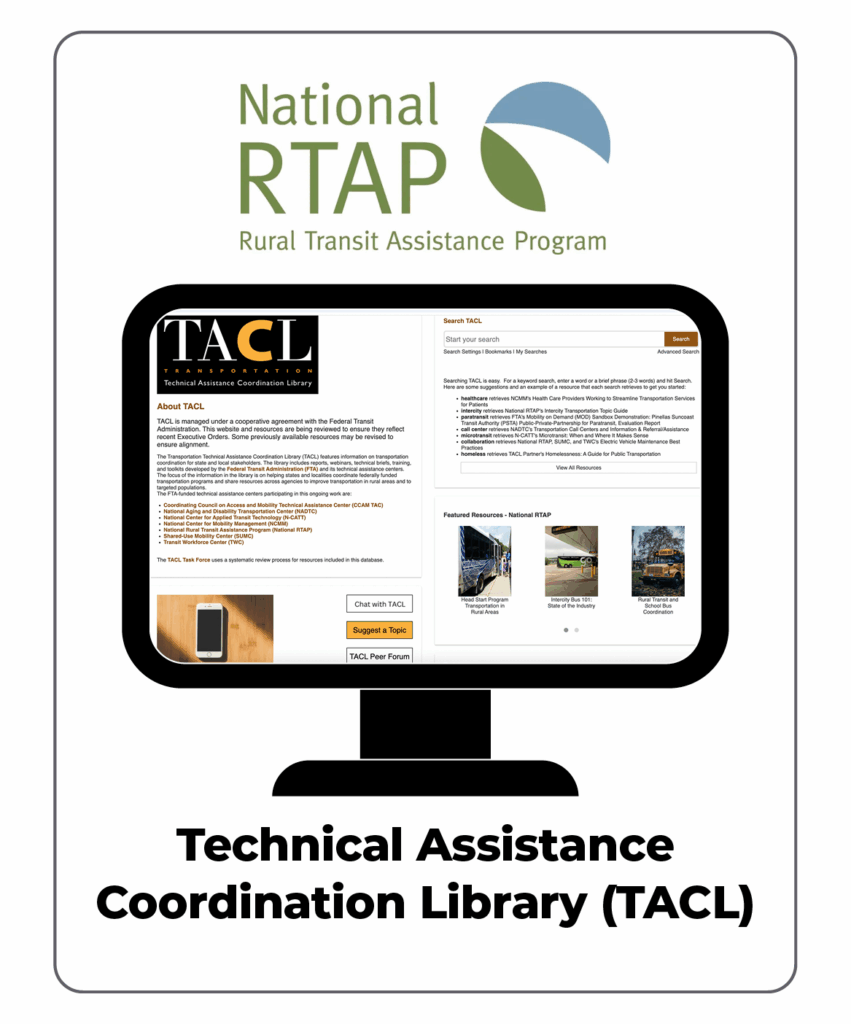
Technical Assistance Coordination Library (TACL)
The Transportation Technical Assistance Coordination Library (TACL) provides a viable methodology and platform for access and findability of rural and tribal transit coordination resources across a broad range of transportation technical assistance centers and the Federal Transit Administration (FTA).
National Rural Transit Assistance Program
TOPICS: Apprenticeship, Career Pathways, Community Engagement, Hiring and Recruitment, Labor-Management Partnerships, Low-No, Mentorship, Policy and Planning, Procurement, Program Evaluation and ROI, Retention, Safety and Health, Trainer and Mentor Development, Training, Workforce Shortage
Transportation Technical Assistance Coordination Library (TACL)
The Transportation Technical Assistance Coordination Library (TACL) provides a viable methodology and platform for access and findability of rural and tribal transit coordination resources across a broad range of transportation technical assistance centers and the Federal Transit Administration (FTA).
The FTA-funded Technical Assistance (TA) Centers participating in this ongoing work are:
- National Aging and Disability Transportation Center (NADTC)
- National Center for Applied Transit Technology (N-CATT)
- National Center for Mobility Management (NCMM)
- National Rural Transit Assistance Program (National RTAP)
- Shared Use Mobility Center (SUMC)
- Transit Workforce Center (TWC)
The TACL Task Force uses a systematic review process for resources included in the database. New resources will be added on a quarterly basis. Let us know if you would like to serve as a peer reviewer for our resources.
Why was TACL created?
The United States Government Accountability Office (GAO) published Public Transportation: Enhanced Federal Information Sharing on Coordination Could Improve Rural Transit Services in January 2020. GAO recommended that FTA “develop a communication plan that will effectively share information with state and local stakeholders on coordination opportunities in an accessible and informative way.” This effort was created to improve interagency resource coordination between FTA and its five TA Centers.
How can TACL be used?
TACL resources can be used to identify high quality technical assistance on transportation coordination. The resources can be used for research, training, practice, operations, planning, and other purposes. We encourage authors to cite TACL resources.
Ready to get started?
Visit http://transportation-tacl.org. Click on the Training tab at the top for instructions.
If you have a question about TACL, or if you would like to be considered to become a TACL peer reviewer, please contact info@nationalrtap.org
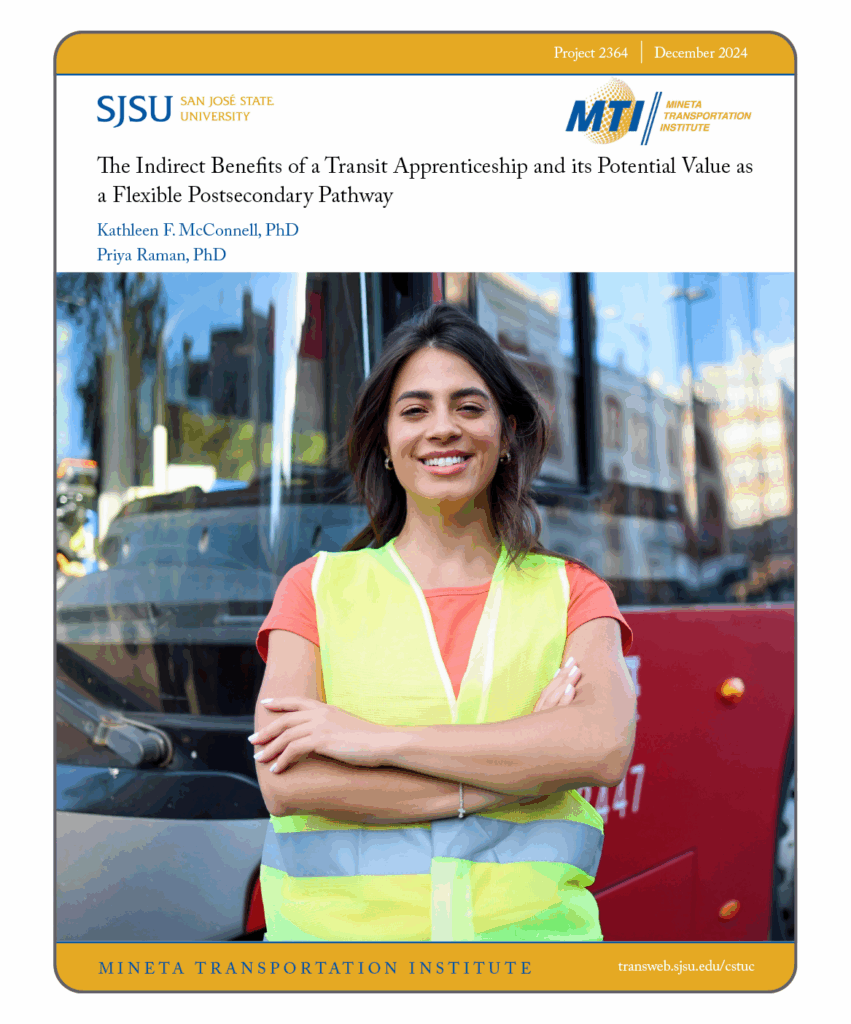
The Indirect Benefits of a Transit Apprenticeship and its Potential Value as a Flexible Postsecondary Pathway
As apprenticeships become more prevalent in the transit industry, they can also emphasize both technical and soft skills to invest in career advancement. This can attract young people to transit careers, which helps address challenges with recruitment and an aging workforce. Santa Clara Valley Transportation Authority’s Joint Workforce Initiative (JWI) employs this model by formally recognizing skills acquisition with accredited certificates. This study explores the JWI’s strengths within the revival of non-degree credentials fueled by efforts like the California Guided Pathways Program. Drawing on guidelines for connecting job training with degree programs, the study details the importance of affordability, portability, and articulation and outlines how these features could be further developed in the JWI.
Mineta Transportation Institute
December 2024
TOPICS: Apprenticeship, Career Pathways, Community Engagement, Hiring and Recruitment, Workforce Shortage





 CLEAR
CLEAR

